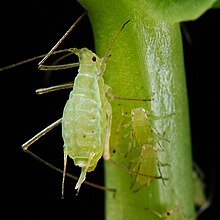| Acyrthosiphon pisum | |
|---|---|

| |
| Adult parthenogenetic pea aphid and progeny feeding on a pea plant | |
| Scientific classification | |
| Domain: | Eukaryota |
| Kingdom: | Animalia |
| Phylum: | Arthropoda |
| Class: | Insecta |
| Order: | Hemiptera |
| Suborder: | Sternorrhyncha |
| Family: | Aphididae |
| Genus: | Acyrthosiphon |
| Species: | A. pisum
|
| Binomial name | |
| Acyrthosiphon pisum Harris, 1776
| |
| Subspecies | |
| |
Acyrthosiphon pisum, commonly known as the pea aphid (and colloquially known as the green dolphin,[1][2] pea louse, and clover louse[3]), is a sap-sucking insect in the family Aphididae. It feeds on several species of legumes (plant family Fabaceae) worldwide, including forage crops, such as pea, clover, alfalfa, and broad bean,[4] and ranks among the aphid species of major agronomical importance.[5] The pea aphid is a model organism for biological study whose genome has been sequenced and annotated.[6]
- ^ Cyrus, Thomas (1879). "Noxious and beneficial insects of the state of Illinois". Report of the State Entomologist (Illinois). 8: 1–212.
- ^ Davis, John (1915). The pea aphis with relation to forage crops (276 ed.). US Department of Agriculture.
- ^ Folsom, Justus W. (1909). The insect pests of clover and alfalfa (134 ed.). Urbana, Illinois, USA: University of Illinois Agricultural Experiment Station. pp. 138–154.
pea aphid green dolphin.
- ^ "Acyrthosiphon pisum". AphID. Retrieved 19 March 2013.
It is particularly important on peas, beans, alfalfa and clover, but also attacks beets, cucurbits, various species of Brassicaceae. It has been implicated in the transmission of over 40 plant viruses.
- ^ Cite error: The named reference
Aphids As Crop Pestswas invoked but never defined (see the help page). - ^ The International Aphid Genomics Consortium (2010). "Genome Sequence of the Pea Aphid Acyrthosiphon pisum". PLOS Biology. 8 (2): e1000313. doi:10.1371/journal.pbio.1000313. PMC 2826372. PMID 20186266.